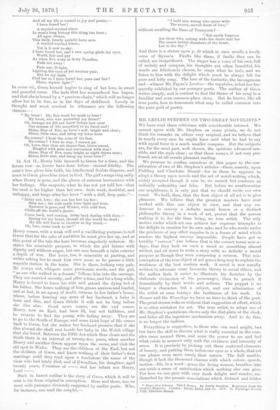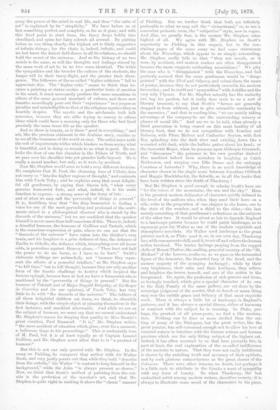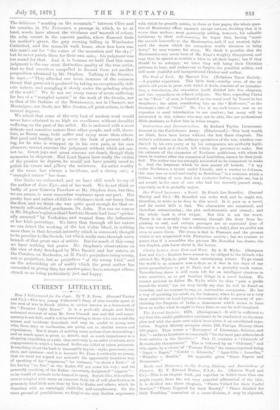MR. LESLIE STEPHEN ON TWO GREAT NOVELISTS.* WE have read
these criticisms with considerable interest. We cannot agree with Mr. Stephen on some points, we do not think his remarks on others very original, and we believe that in nearly every case he might have said what he had to say with equal force in a much smaller compass. But the subjects are, for the most part, well chosen, the opinions advanced Sen- sible, and the style clear; so that these essays, if not very pro- found, are at all events pleasant reading.
We propose to confine ourselves in this paper to the con- sideration of two of Mr. Stephen's articles—those, namely, upon Fielding and Charlotte Bronta—for in thorn he appears to adopt a theory upon novels and the art of novel-writing which, widely accepted though it now be, we cannot but condemn as radically unhealthy and false. But before we anathematise our neighbours, it is only just that we should recite our own creed. We hold, then, that the first object of all art is to give pleasure. We believe that the greatest masters have ever worked with this one object in view, and that any en- deavour to convey a definite moral lesson or a distinct philosophic theory in a work of art, proves that the person making it is, for the time being, no true artist. The only motive under which art can achieve her supreme triumphs is the delight in creation for its own sake, and he who works under the guidance of any other impulse is in a frame of mind which renders the highest Success impossible. People have got so terribly "earnest" (we believe that is the correct term) now-a- days, that they look on such a mood as something almost • wicked, and sit down to write a story with as definite a moral purpose as though they were composing a sermon. This mis- conception of the true object of art goes a long way to explain the weakness of the best modern work. A novel is now usually written to advocate some favourite theory in social ethics, and the author finds it easier to illustrate his doctrine by the elaborate vivisection of his personages, than to preach it dramatically by their words and actions. The puppet is no longer a character, but a subject, and our admiration of the artist at once betrays the faultiness of his work. In Homer and the 1Vaverleys we have no time to think of the poet. The great stream rolls on without that suggestion of effort, which is so often mistaken for art. The true artist, to adopt one of Mr. Stephen's quotations shows only the dial-plate of the clock, and hides all the ingenious mechanism away. And to do this, is no longer the fashion.
Everything is suggestive, to those who can read aright, but few have the skill to discern what is really essential in the com- plex maze around them, and none the power to see and feel
what exists in memory only with the vividness and intensity of sense. It is precisely by picking out these scattered elements
of beauty, and putting them before our eyes as a whole, that art can please even more surely than nature. The dull marble, though it lack the thousand charms with which colour, speech, motion—life, in a word—grace the living woman, breathes into our souls a sense of satisfaction which nothing else can give. For here we can gaze with ever fresh delight and wonder, un- disturbed by the prosaic associations which distract and fritter
4' flours ffi a Library. Third Series. By Malta Stephen. Itrprtnied rront the Carnbill Magazine. London Smith, Elder, and Co. 1879. II. Fielding's Novels. VIII. Charlotte Broutt1.
away the power of the mind in real life, and thus "the calm of art" is explained by its "simplicity." We have before us at last something perfect and complete, so far as it goes; and with this fixed point to start from, the fancy drops boldly into cloudlaud, and spins her fairy cobweb all around. By putting before us one thing clearly, the highest art is dimly suggestive of infinite things ; for the chain is, indeed, infinite, and could we but know the tiniest field-flower in all its relations, we should hold the secret of the universe. And as the history of no two minds is the same, so will the thoughts and feelings stirred by the same work of art be in no two cases identical. The wider the sympathies and the broader the culture of the students, the longer will be their fancy-flight, and the greater their diver- gence. The followers of the so-called "higher ccism " fail to appreciate this. The "higher critic" seems to think that be- cause a painting or statue excites a particular train of emotion in his mind, it must necessarily produce the same sensations in others of the same general standard of culture, and these new fanatics accordingly pour out their " experiences " in a jargon as peculiar and unintelligible as that of the religious mystics they so heartily despise. The mystic and the art-fanatic both talk nonsense, because they are alike trying to convey to others ideas which could have a meaning only for those who had lived precisely the'sa.me inner life as the speaker.
And as there is beauty, so is there "good in everything ;" and art, like the precious ointment in the Arabian story, enables us to see all the treasures of the world at once. The artist tears aside the veil of importunate trifles which hinders us from seeing what is beautiful, and in doing so reveals to us what is good. Ho un- locks the door of one fair chamber in the Palace of Truth, and we peer over his shoulder into yet grander halls beyond. He is really a moral teacher, but only, as it were, by accident.
Now Mr. Stephen would seem to hold a very different doctrine. He complains that M. Paul, the charming hero of Villette, does not carry us "into the higher regions of thought," and contrasts him with Uncle Toby ; and he explains away that most delight- ful old gentleman, by saying that Sterne felt, "what every genuine humourist feels, and what, indeed, it is his main function to express,—a strong sense of the irony of fate ..
and of what we may call the 'perversity of things in general."
It is, doubtless, true that "the deep humourist is finding a voice for one of the most pervading and profound. of the senti- ments raised in a philosophical observer who is struck by the discords of the universe," but we are confident that the speaker himself is never more than half conscious of this. There is, indeed, a dreadful humour, the humour of Gulliver and Tartufe, which is the conscious expression of pain, where we can see that the "discords of the universe" have eaten into the thinker's very brain, and his laughter is a grim defiance of fate, the defiance of Emilia to Othello, the defiance which, triumphing over all lesser odds, is powerless against Heaven alone,—" Thou hest not half the power to do me harm, as I have to be hurt." Swift's elaborate triffings are melancholy, not "because they repre- sent the efforts of a powerful intellect," as Mr. Stephen says, "to kill' time," but to kill thought, because they are only another form of the frantic challenge to destiny which inspired the famous epitaph, because here at last we have a humourist who is maddened by the "perversity of things in general." But the humour of Falstaff and of Major Dugald Dalgetty, of SirRoger de Coverley and (in our opinion), of Uncle Toby, • has very little to do with "the discords of the universe." The fathers of all these delightful children sat down, we think, to chronicle their doings, with the simple object of pleasing themselves in the first instance, and mankind afterwards. And while we are on the subject of humour, we must say that we cannot understand Mr. Stephen's reason for denying that quality to Miss 13rontes
great creation, Paul Emanuel. "It is," Mr. Stephen writes, "the mere accident of situation which gives, even for a moment, a ludicrous tinge to his proceedings." This is undeniably true of M. Paul, but it is at least equally so of Captain Lemuel Gulliver, and Mr. Stephen must allow that he is "a product of humour."
But this is not our only quarrel with Mr. Stephen. In the essay on Fielding, he compares that author with Sir Walter Scott, and very justly points out that while they both "describe from the outside," Sir Walter "i5 content to keep himself in the background," while Sir John "is always present as chorus." Now, we think that Scott's method of painting from the out- side is the perfection of the novelist's art, and that Mr. Stephen is quite right in ranking it above the " choric " manner of Fielding. But we further think that both are infinitely preferable to what we may call the " vivisectional," or, to use a somewhat pedantic.term, the " subjective " style, now in vogue.
And this, we greatly fear, is the system Mr. Stephen rates highest of all. We agree with Mr. Stephen on Scott's superiority to Fielding in this respect, but in the con- eluding pages of the same essay we find sonic statements about the Waverleys, which appear to us simply astounding. Mr. Stephen coolly tells us that "they are novels, as it were, by accident, and modern readers are often disappointed . because the naufe suggests misleading associations." We pity the man who is " disappointed " with the Waverleys, and feel perfectly assured that the same gentleman would be " disap- pointed " with the Iliad and Odyssey, and refuse them the name of poetry, because they do not particularly resemble his modern
favourites; and he could not " sympathise" with Achilles and the very wily Ulysses. For Mr. Stephen actually has the audacity (we beg his pardon, but it really does seem to us a sort of literary treason), to say that Scott's "heroes are generally dropped in from without, just to give ostensible continuity to the narrative ;" and that in reading him, "we are meiely taking advantage of the compaurto see the surrounding scenery or phases of social life." And are we to be told, when already a third generation is being reared on this most healthy of all literary food, that we do not sympathise with Ivanhoe and Rebecca, with Flora Mcivor and Catharine Seyton, with Rob Roy splashing into the dark river and swirling clown like a wounded wild duck, while the bullets patter about his head ; or the immortal Major, when he pounces upon Gillespie Gruma,ch, and "'discourses " the prisoner in his own peculiar dialect? Has mankind indeed been mistaken in laughing at Caleb Balderston, and weeping over Effie Deans and the unhappy Countess of Leicester ? Why, there ie as much knowledge of character shown in the single scone between Jonathan Oldbuck and Maggie Mucklebackit, the fishwife, as in all the books that have been written since the death of Thackeray
But Mr. Stephen is good enough to admire Scott's keen ear "for the voices of the mountains, the sea, and the sky." Here is the greatest modern delineator of character quietly reduced to the level of the authors who, when they send their hero on a ride, write in the proportion of one chapter to the horse, one to the state of the weather, and a third to the rider,—the last mainly consisting of that gentleman's reflections on the subjects of the other two. It would be about as fair to degrade Raphael to a landscape painter because ho could paint landscape, as to represent poor Sir Walter as one of the modern vegetable and atmospheric novelists. Sir Walter used, landscape as the great painter used it, as Plato used it, as, in our own day, Thackeray has, with consummate skill, used it, to set off and relieve the human action involved. The tender herbage peeping from the rugged clefts of Mount Thabor, the smiling, peaceful country of the "St. Michael" of the Louvre, soothe us, as we gaze on the tormented figure of the demoniac, the thwarted fury of the fiend, and the austere majesty of the avenging Archangel ; while by their very brightness, their calm and their lowliness, they relieve and heighten the terror, tumult, and awe of the action in the foreground. Or, again, the profusion of rich grasses and ferns,. so lovingly touched, which give a special character of its own to the Holy Family of the same gallery, are set there by the sovereign judgment of the master, that no harsh or mean thing may mar the subtile grace and delicacy of that most exquisite work. There is always a little bit of landscape in Raphael's pictures, and it has always a special fitness, either of harmony or contrast with the subject he is treating. In Plato, per- haps, the greatest of all prose-poets, we find a like modera- tion. Nothing can be finer or more studied than the set- ting of many of the Dialogues, but the great writer, like the great painter, has self-command enough not to allow his love of external nature to interfere with-the human actions and human passions which are the only fitting subject of the highest art. Indeed, it has often occurred to us that here probably lies, in part at least, the real explanation of the so-called indifference of the ancients to nature. That they were not really indifferent is shown by the unfailing truth and accuracy of their epithets, and by such glorious nature-hymns as the great chorus of the Ooloneus. There were other reasons, no doubt, but perhaps it is a little rash to attribute to the Greeks a want of sympathy with any form of beauty. So when Thackeray, the last undoubted artist among modern writers, describes scenery, it is always to illustrate some mood of the characters in his piece. The delicious "meeting on the mountain" between Clive and his cousins, in The Newemnes, a passage in which, to us at least, words have almost the vividness and 'warmth of colour, the calm sunset in the convent garden, where Esmond finds his mother's grave, the grey evening falling in Winchester Cathedral, and the moon-lit walk home, show how keen was this man's ear for "the voices of the mountain and the sky ;" but he never paints them for their own sake,—his judgment was too sound for that. And it is because we hold that this same judgment is the one most distinctive quality of the true artist, that we find ourselves compelled to dissent from yet another proposition advanced by Mr. Stephen. Talking of the Brontës, he says :—" They afforded one more instance of the common theory that great art is produced by taking an exceptionally deli- cate nature, and mangling it slowly under the grinding wheels of the world." We do not see many traces of acute suffering, far less of a "mangled nature," in the work of the Greeks, nor in that of the Italians of the Renaissance, nor in Chaucer, nor Montaigne,. nor. Scott, nor Miss Austen, all great artists, in their several degrees.
We admit that some of the very best of modern work would never have attained to so high an excellence without dreadful ouffering on the part of the artist. He is endowed with a more delicate and sensitive nature than other people, and will, there- fore, as Burns sang, both suffer and enjoy more than others.
But good and healthy art ia never the fruit of present suffer- ing, for he who is wrapped up in his own pain, or his own pleasure, cannot exercise the judgment without which art can- not be. Great joys and great sorrows are dumb, though their memories be eloquent. Had Lord Byron been really the victim of the passion he depicts, he would not have greatly cared to polish his verses and. pillory the reviewers. An artist worthy .of the name has always a backbone, and a strong One ; a "mangled nature" has none. Our limits are exhausted, and we have still much to say of the author of Jane Eyre, and of her work. We do not think so badly of poor Girrevra Fanshaw as Mr. Stephen does, but this, we are aware, is mere masculine weakness upon our part. Her pretty face and rather childlike selfishness took our fancy from the first, and we think she was quite good enough for 'that ex- tremely self-satisfied gentleman, Dr. John. Nor can we concur in Mr. Stephen's opinion that Charlotte Broutii had been" spiritu- ally annexed" by Yorkshire, and weaned from the influences of her Irish parentage. We fancy that through all her nature we can detect the working of the hot Celtic blood, in nothing more than in that feverish intensity which is commonly thought to be peculiar to the Scotch, but which really runs through every branch of that great race of artists. But for much of this essay we have nothing but praise. Mr. Stephen's observations on the view of duty developed by Miss Bronte and her sisters, on the Curates; on Rochester, on M. Paul's prejudices being wrong, not as prejudices, but as prejudices "of the wrong kind," and on the astonishing air of reality which the great author has succeeded in giving this, her master-piece, have, amongst others, struck us as being particularly just and happy.




































 Previous page
Previous page